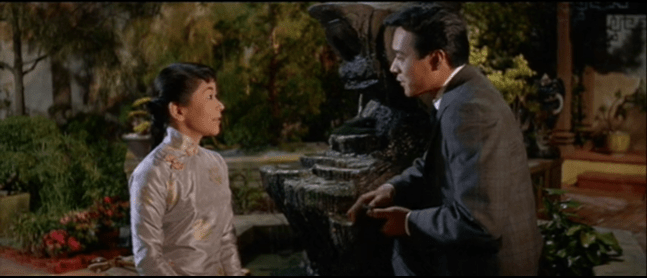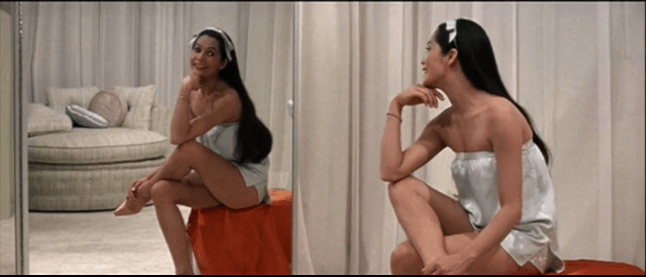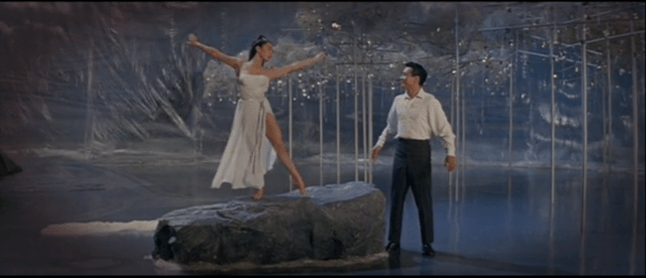
When I took a Broadway performance class at Sierra College we were required to audition for the spring musical, which was to be A Funny Thing Happened On the Way To the Forum. I had no interest in being in the show whatsoever but I wanted my grade so I signed up.
Anyone who has ever tried show business can attest that auditions are a necessary horror. Directors must sprout high-powered microscopes from their eyes just for those occasions, because a hopeful’s every insecurity, every pretention and every blemish stick out in unwavering high relief the second they climb onto the stage.

Somehow my vocal coach and I settled on the vampy showpiece, “I Enjoy Being A Girl” from Rodgers and Hammerstein’s Flower Drum Song. As someone who’s never been vampy or showy, was not a fan of girl talk, and who at the time had a lousy track record with guys, I felt uncomfortable from the beginning. Come the day of the audition I stood under the spotlight feeling as if my face was melting off of my skull, but even so I forced myself to belt out how much I loved talking on the phone while masked in a pound and a half of cream. I meant none of it and the director knew it, although he was very nice.
My friend, Nick, being quite the competent actor, was not similarly afflicted and played a glorious Miles Gloriosus, while I happily watched from the audience awash in a mix of pride and relief. I still hate auditions.

Flower Drum Song, however, is fun. It’s a lilting, amiable blending of American and Chinese cultures, and in its own way, it is a romanticized ode to one of life’s biggest auditions, love and marriage. Set in San Francisco’s Chinatown, the story follows Mei Li, a lady who comes over from China illegally to marry Sammy Fong, a restaurant owner whose mother picked out a picture bride for him from the old country.
Mei Li and her dad are all set to honor the contract, but the reality is much more complicated. Sammy is in love with Linda, the star of his floor show, and Linda, like the longsuffering Abigail of Guys and Dolls, is tired of waiting for Sammy to propose. It’s been five years, after all, so her impatience is understandable.

Sammy’s got a Plan B: A friend of his, Madame Liang, is related to Master Wang, a very traditional Chinese man who wants his oldest son, Wang Ta, to marry a Chinese girl. Wang Ta, a cute guy with an active social life, is immediately interested in Mei Li, but Linda is too intriguing to ignore. Naturally, things are still inevitably complicated, and naturally, things go to Hades before they go to heaven.
Flower Drum Song is probably Rodgers and Hammerstein’s most unusual musical. It wasn’t their first foray into Asian culture, at least from the standpoint of setting and story, but it was completely from a Chinese and Chinese American point of view, only done in a mostly universal way, emphasis on “mostly.”

The production was based on a novel of the same name by Chin Yang Lee, who was born in China’s Hunan province in 1915. Lee’s family were all scholarly, and Lee graduated from National Southwestern Associated University with a Bachelor of Arts degree in 1942. In 1943 he emigrated to the United States, where he earned his Master’s in playwrighting from Yale. Then he moved to Los Angeles and then San Francisco, where he wrote for two Chinatown newspapers and worked as a translator and Chinese teacher, all while continuing to write. In fact, the impetus for Flower Drum Song started while Lee was at Yale, where he hit on the idea of blending American and Chinese culture in a story.
Flower Drum Song was Lee’s first novel. Originially titled Grant Avenue, the book was shopped around to various publishers with no takers. Farrar, Straus and Cudahy finally accepted it after their elderly reader scrawled “Read this” on the manuscript before dying in his sleep.

The book was a runaway success and was adapted for the stage by Rodgers and Hammerstein, the latter of whom discovered the book via his friend, Joseph Fields. According to the R&H website, that august duo hit the ground running, with the musical opening at the St. James Theatre on West 44th Street on December 1, 1958, and running for six hundred performances before closing on May 7, 1960. Meanwhile, the show also opened at the Illustrious Palace on London’s West End on March 24, 1960, where it would run for four-hundred sixty-four performances.
Not that it was an easy road getting there. Revisions and rehearsals had to be postponed while Mr. Hammerstein recovered from a fall, and the show’s original director, Gene Kelly, thought the show was relatively poor compared to Rodgers and Hammerstein’s other shows, calling it an “audience show rather than something for the critics.” He and choreographer, Carol Haney carefully cast as many Chinese and other actors of Asian background as they could, but the pool was small because Asians at the time largely avoided the acting profession. Kelly stuffed the show with schtick to keep it all as fun as possible.

When it came to the film adaptation, though, changes were made. Heck, there were a lot of changes made for the original stage play; for instance, in the novel local seamstress Helen commits suicide after a failed affair with Wang Ta, but in both the stage musical and the film Wang Ta just falls asleep in Helen’s bed after a Lunar New Year bender, leaving Helen to remain a Miss Lonelyheart. The arranged marriage arc was also a device for the play and film, and in the novel Mei Li comes to America through legal channels. The order of the music was also shuffled for pacing purposes in the film.
Kelly was right about the play and film’s reception. Even though they were both well-received by the public, the critics weren’t exactly kind. Variety called it “a curiously unaffecting, unstable and rather undistinguished experience.”

Time Magazine said Flower Drum Song was “a creation in the spirit of a reversible cornflake that can also serve as a sequin. In the movie nothing of value has been eliminated, but nothing of interest has been added,” also criticizing the filmmakers’ decision to cast actors who weren’t Chinese: “Honest, fellows, they really don’t all look alike.”
Meanwhile, the eternally hard-to-please Bosley Crowther was more complimentary: “It is gaudy and gaggy and quite melodic. Along those lines, it is quite a show.”

And what did Chin Yang Lee think? While he was flattered that his work had been adapted for the stage and screen, like his fellow Rodgers and Hammerstein veteran Maria von Trapp, he thought the adaptation, particularly the film, was too saccharine. Many Asian Americans feel the same way, because the play and film do reflect some Asian stereotypes, although in many cases the stereotypes are juxtaposed with American ones and played for irony, such as in the song, “Chop Suey.” As we all know, chop suey is about as Chinese as cioppino is Italian, but the Chinese characters in Flower Drum Song regard it with amusement.
Many people are also proud of Flower Drum Song because it was one of the first big-budget films featuring a real Asian cast and an Asian-centered story. Even so, the play hasn’t been revived often because it’s so culture-specific.

In 2002, David Henry Hwang resurrected the show with an all-new book, drawing the culture blend in stronger colors while retaining the original score and featured Lea Salonga as Mei Li and Jose Llana as Wang Ta. It ran at the Virginia Theatre on Broadway between October 17, 2002 and March 16, 2003, giving one hundred sixty-nine performances in all (Watch a clip here). Lee was very happy with the renewed interest in his work and with the now-growing number of Chinese actors.
While Flower Drum Song might not be Rodgers and Hammerstein’s best or most well-known show, it is unique to the American experience, whether those Americans were born or naturalized, and that makes it special.

The What A Character! Blogathon is coming up on Sunday. Thanks for reading. all…
Flower Drum Song is available to own on DVD and Blu-ray from Amazon and is free to stream for Prime customers. Chin Yang Lee’s original novel is also available.
~Purchases made via Amazon Affiliate links found on this site help support Taking Up Room at no extra cost to you.~
If you’re enjoying what you see on Taking Up Room, please look for additional content on Substack, where you’ll find both free and subscriber-only articles. I publish every Wednesday and Saturday.
Bibliography
Yudkoff, Alvin. Gene Kelly: A Life of Dance and Dreams. New York City: Back Stage Books, 1999.

I’ve never seen Flower Drum Song, and I don’t really know any of the music, but your review makes me want to change that!
LikeLiked by 1 person
That’s great–glad you enjoyed it! Hope you like “Flower Drum Song,” too. 🙂
LikeLike